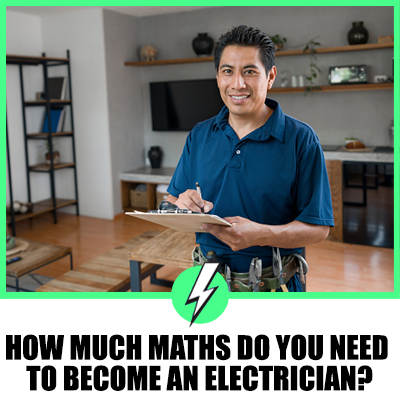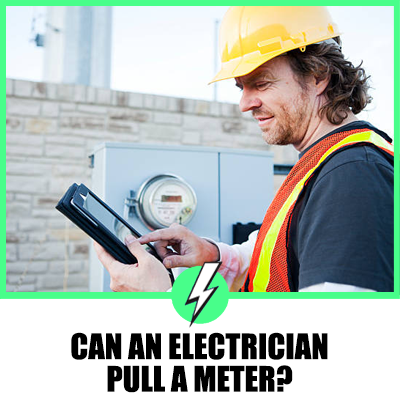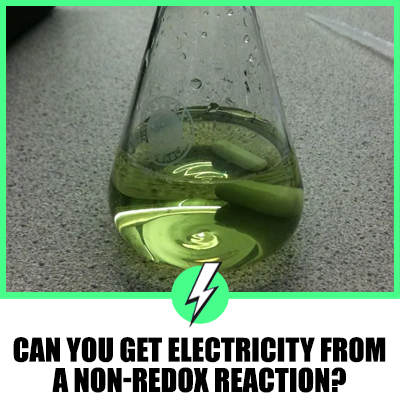How Much Maths Do You Need to Become an Electrician?
Are you thinking about becoming an electrician but are worried your maths is not good enough to make the grade?
Electricians use maths daily in their work; there is no getting away from it. To start an electrical apprenticeship, you will need to have 5 GCSEs, two of which are maths and English. The grades cannot be less than a C. However, if you don’t meet this criterion, you can take extra lessons in college.

Contents
How smart do you have to be to be an electrician?
Electricians are pretty smart people and have a good base education of 5 GCSEs, but past this, you can learn what is required to become an electrician.
If you can do mental arithmetic quickly and have a calculator in your pocket, you can get through most scenarios as an electrician.
Which electrical speciality needs the least calculations? It’s a tough one to answer because all specialities need to be able to do maths, a little algebra, and trigonometry in their daily routine.
You would have to guess the domestic installer uses some of the simplest forms or equations, which in fairness if you can’t do, you should look to join another trade.
What kind of math do electricians use?
Electricians use several types of math to perform their work effectively, including:
- Basic Arithmetic: Addition, subtraction, multiplication, and division are fundamental for measuring materials, calculating area, and determining the quantity of components needed.
- Algebra: Solving for unknown variables is important, especially when determining electrical load, resistance, voltage, and current using Ohm’s Law (V = IR, where V is voltage, I is current, and R is resistance) and the Power Formula (P = IV, where P is power).
- Geometry: Understanding shapes and sizes helps in calculating the length of wire needed to run along walls and through conduits, as well as in determining the area and volume of spaces for heating and cooling requirements.
- Trigonometry: This is used for calculating angles and distances, especially when installing electrical components in non-standard layouts and when working with alternating current (AC) circuits, where sine waves are involved.
- Units Conversion: Electricians must convert between different units of measurement, such as inches to centimeters, or watts to kilowatts.
- Fractions and Decimals: Working with fractions and decimals is common when measuring and cutting materials to precise sizes.
Understanding and applying these types of math ensures that electrical systems are safe, efficient, and comply with the relevant codes and standards.
Do electricians use algebra?
Yes, electricians use maths daily to figure out certain things in circuits, such as resistance known as ohms Ω. Without these skills, it would be hard for an individual to work as a qualified electrician, and you may want to become an electrician mate while your confidence is building.
You will need an understanding of algebra to be able to tackle the equations used in trigonometry and calculus.
What is the basic electrical formula?
Most commonly used electrical formulas are related to voltage, current, power, resistance etc. These are used daily by electricians all over the world. The good news is the formulas are simple to use with practice.
| Quantity | Formula | Unit |
| Voltage | V = I R | Volt (V) |
| Current | I = V R | Ampere (A) |
| Resistance | R = V I | ohm ( ω ) |
| Power | P = VI | Watt (W) |
How do you learn Ohm’s law?
It just takes a little practice. Once you have done this a few times, it will be embedded in your brain forever.
Ohm’s Ω Law is simply V+IR, V=voltage, I =current and R =resistance. Ohm’s Law allows the electrician to understand the characteristics of a circuit, like how much current is flowing through it.
You can change the configuration of the values and find out any of the values by multiplying or dividing.
Below is a simple calculation used by electricians daily to determine how many amps are in a circuit. There are 3 circuits. Vs is the known voltage, and the rest is self-explanatory.
What is the power factor formula?
Pf is the power being used in an available circuit, and the apparent power is the working electricity that may be powering a motor.
Pf is measured in kWh and apparent power in kVa The apparent power is known as the demand power of the circuit.
The power factor can be found by multiplying.
What is the equation i Q t?
1 amp is the current the air flows in a circuit when one coulomb passes a point in a circuit in 1-second
It’s the relationship between i and the quantity of charge:
SI derived units used in electricity:
| Name | Symbol | Quantity |
| watt | W | power |
| volt | V | voltage (electric potential difference) |
| ohm | Ω | resistance, impedance |
| farad | F | capacitance |
How long does it take to train to be an electrician?
It takes 4 years of training to become a qualified electrician in the UK. You will attend day release college 1 day per week during the academic year and then work with a qualified electrician who will teach you the trade.
If you place maths aside for 1 second, one of the most important training aspects for an electrician is hands-on experience and knowing how to wire a consumer unit neatly.
Being an electrician is not a solitary job. Most of the time, you are part of a team, and you need the personal skill to fit in with a team. Sometimes, this skill can’t be learned and is entrenched in your personality.
What skills do you need to be an electrician?
Some hard skills are needed for the electrical trade that will help you immensely during your training as an electrician.
- A good understanding of maths, physics, and algebra. You may be taking measurements and working out 2 for a room or calculating the resistance in a circuit. You will find maths is an essential requirement.
- You should have problem-solving skills, and it can be anything from difficult wiring to having run out of milk!
- Being an electrician is not solitary. You will need to be able to work with others and take instructions and criticism.
- Time management, being late is a sin.
- You will need to be able to communicate clearly and effectively.
- Patience is needed as not all things go to plan.
- Honesty will take you a long way in your career, be honest and always.
What are the pros and cons of being an electrician?
These are just a few pros and cons, but it’s easy to see the pros outweigh the cons significantly.
| Pros | Cons |
| No degree required | Long apprenticeship |
| You get paid while you train | Electrical work can be dangerous |
| Electrical work is varied | |
| Great salary when qualified | |
| Good opportunity for self-employment | More paperwork and possible VAT registration |
These are just a few of the pros and cons but it’s easy to see the pros outweigh the cons significantly.
How much do electricians make in the UK?
A lot depends on your attitude and ability as an electrician, but if you are motivated, you can earn 100k plus as a self-employed electrician. You may need to bring a couple of electricians on board to get more work done, but it’s achievable.





